HLTH 1037 Assessment 2: ISBAR and Mental State Examination Report
VerifiedAdded on 2022/11/18
|7
|2281
|291
Practical Assignment
AI Summary
This assignment presents a comprehensive ISBAR clinical handover and Mental State Examination (MSE) for a patient with major depressive disorder, as part of the HLTH 1037 course. The student, acting as a Registered Nurse, details the patient's situation, background, and assessment based on a provided video. The ISBAR section covers the patient's admission due to mood disorder, including symptoms like poor sleep, agitation, and suicidal ideation. The background includes the patient's history of separation, alcohol consumption, and hypertension. The assessment highlights the patient's symptoms according to DSM-V criteria and potential risks. Recommendations include mini-mental state examination, short and long-term plans such as relaxation techniques, CBT, and exercise. The MSE section provides a detailed analysis of the patient's appearance, behavior, conversation, affect, perceptions, cognition, and insight, identifying a therapeutic relationship and potential risk issues. The document provides a detailed understanding of the patient's condition, assessment, and management plan, including the need for multidisciplinary involvement and ongoing care strategies. The document provides an in-depth look at the patient's mental state, offering a comprehensive view of their condition and the care they require.
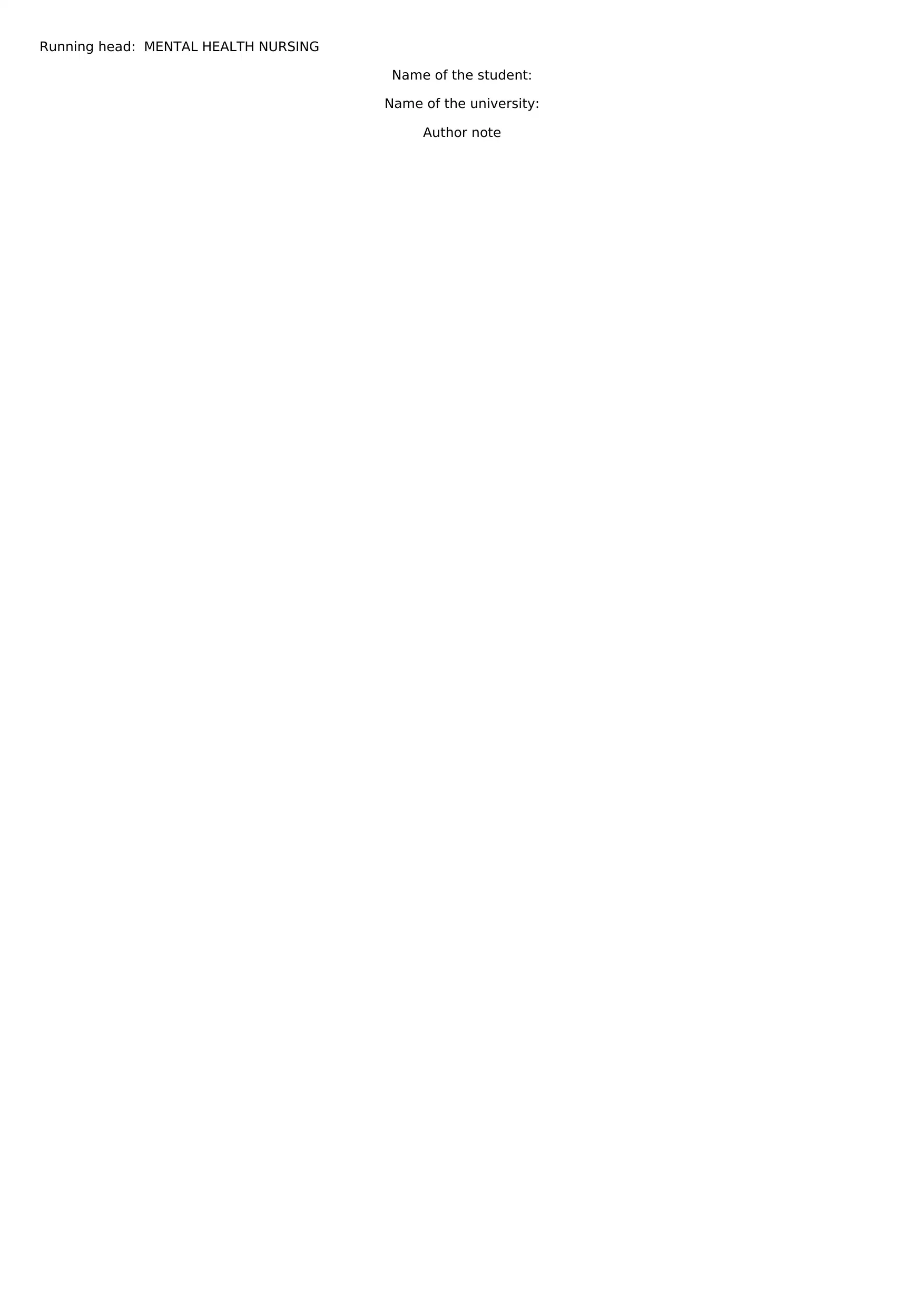
Running head: MENTAL HEALTH NURSING
Name of the student:
Name of the university:
Author note
Name of the student:
Name of the university:
Author note
Paraphrase This Document
Need a fresh take? Get an instant paraphrase of this document with our AI Paraphraser
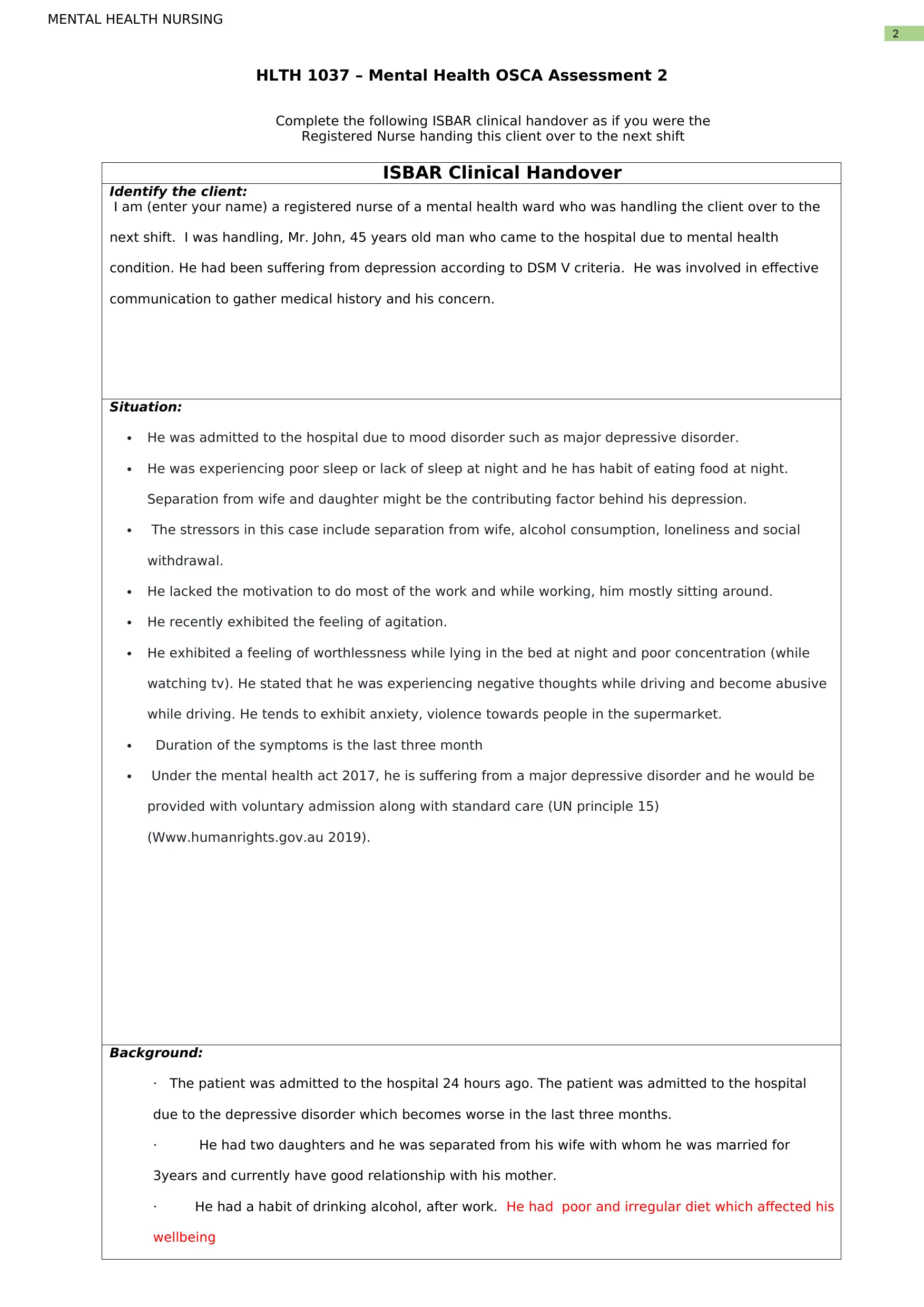
2
MENTAL HEALTH NURSING
HLTH 1037 – Mental Health OSCA Assessment 2
Complete the following ISBAR clinical handover as if you were the
Registered Nurse handing this client over to the next shift
ISBAR Clinical Handover
Identify the client:
I am (enter your name) a registered nurse of a mental health ward who was handling the client over to the
next shift. I was handling, Mr. John, 45 years old man who came to the hospital due to mental health
condition. He had been suffering from depression according to DSM V criteria. He was involved in effective
communication to gather medical history and his concern.
Situation:
He was admitted to the hospital due to mood disorder such as major depressive disorder.
He was experiencing poor sleep or lack of sleep at night and he has habit of eating food at night.
Separation from wife and daughter might be the contributing factor behind his depression.
The stressors in this case include separation from wife, alcohol consumption, loneliness and social
withdrawal.
He lacked the motivation to do most of the work and while working, him mostly sitting around.
He recently exhibited the feeling of agitation.
He exhibited a feeling of worthlessness while lying in the bed at night and poor concentration (while
watching tv). He stated that he was experiencing negative thoughts while driving and become abusive
while driving. He tends to exhibit anxiety, violence towards people in the supermarket.
Duration of the symptoms is the last three month
Under the mental health act 2017, he is suffering from a major depressive disorder and he would be
provided with voluntary admission along with standard care (UN principle 15)
(Www.humanrights.gov.au 2019).
Background:
· The patient was admitted to the hospital 24 hours ago. The patient was admitted to the hospital
due to the depressive disorder which becomes worse in the last three months.
· He had two daughters and he was separated from his wife with whom he was married for
3years and currently have good relationship with his mother.
· He had a habit of drinking alcohol, after work. He had poor and irregular diet which affected his
wellbeing
MENTAL HEALTH NURSING
HLTH 1037 – Mental Health OSCA Assessment 2
Complete the following ISBAR clinical handover as if you were the
Registered Nurse handing this client over to the next shift
ISBAR Clinical Handover
Identify the client:
I am (enter your name) a registered nurse of a mental health ward who was handling the client over to the
next shift. I was handling, Mr. John, 45 years old man who came to the hospital due to mental health
condition. He had been suffering from depression according to DSM V criteria. He was involved in effective
communication to gather medical history and his concern.
Situation:
He was admitted to the hospital due to mood disorder such as major depressive disorder.
He was experiencing poor sleep or lack of sleep at night and he has habit of eating food at night.
Separation from wife and daughter might be the contributing factor behind his depression.
The stressors in this case include separation from wife, alcohol consumption, loneliness and social
withdrawal.
He lacked the motivation to do most of the work and while working, him mostly sitting around.
He recently exhibited the feeling of agitation.
He exhibited a feeling of worthlessness while lying in the bed at night and poor concentration (while
watching tv). He stated that he was experiencing negative thoughts while driving and become abusive
while driving. He tends to exhibit anxiety, violence towards people in the supermarket.
Duration of the symptoms is the last three month
Under the mental health act 2017, he is suffering from a major depressive disorder and he would be
provided with voluntary admission along with standard care (UN principle 15)
(Www.humanrights.gov.au 2019).
Background:
· The patient was admitted to the hospital 24 hours ago. The patient was admitted to the hospital
due to the depressive disorder which becomes worse in the last three months.
· He had two daughters and he was separated from his wife with whom he was married for
3years and currently have good relationship with his mother.
· He had a habit of drinking alcohol, after work. He had poor and irregular diet which affected his
wellbeing
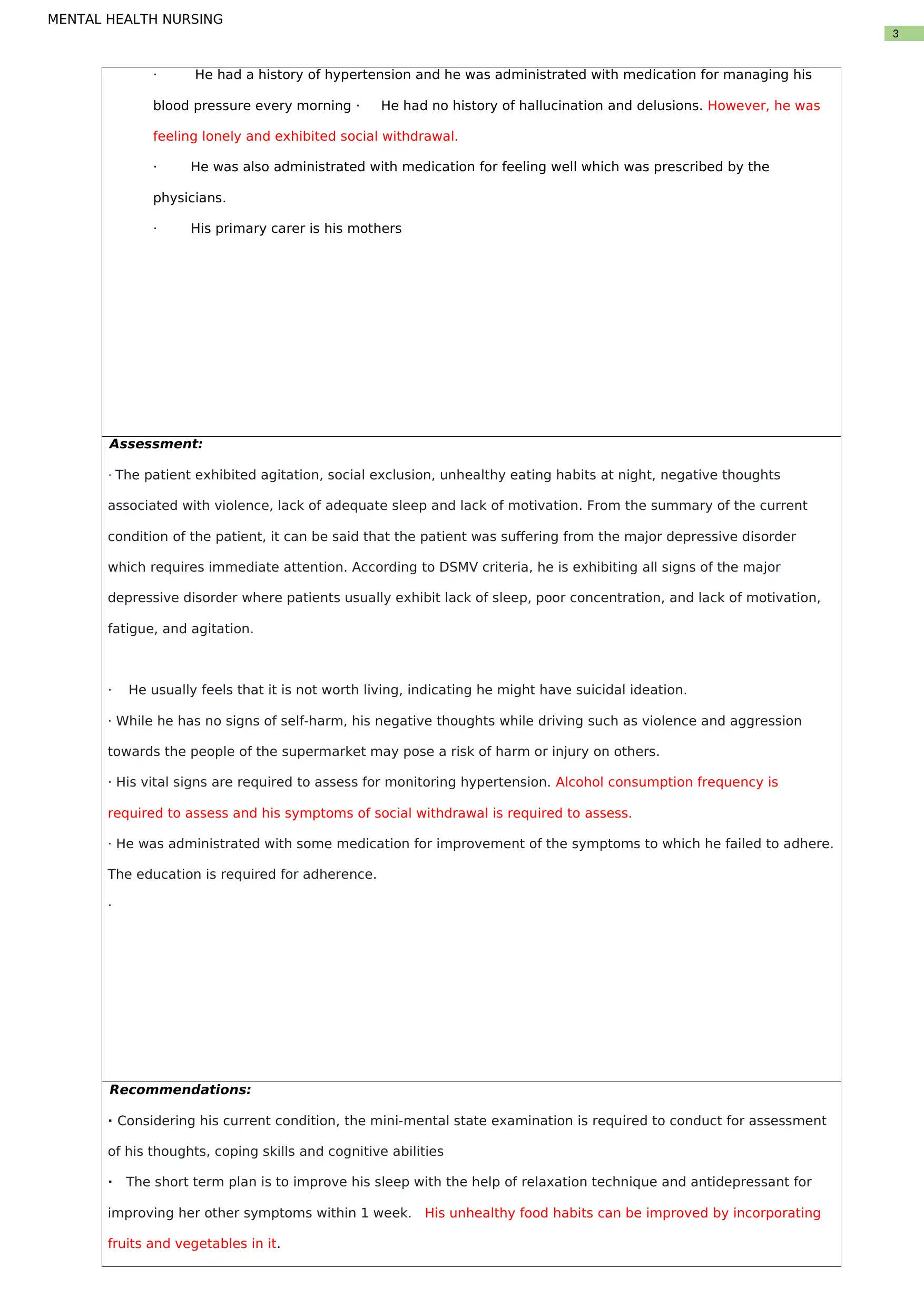
3
MENTAL HEALTH NURSING
· He had a history of hypertension and he was administrated with medication for managing his
blood pressure every morning · He had no history of hallucination and delusions. However, he was
feeling lonely and exhibited social withdrawal.
· He was also administrated with medication for feeling well which was prescribed by the
physicians.
· His primary carer is his mothers
Assessment:
· The patient exhibited agitation, social exclusion, unhealthy eating habits at night, negative thoughts
associated with violence, lack of adequate sleep and lack of motivation. From the summary of the current
condition of the patient, it can be said that the patient was suffering from the major depressive disorder
which requires immediate attention. According to DSMV criteria, he is exhibiting all signs of the major
depressive disorder where patients usually exhibit lack of sleep, poor concentration, and lack of motivation,
fatigue, and agitation.
· He usually feels that it is not worth living, indicating he might have suicidal ideation.
· While he has no signs of self-harm, his negative thoughts while driving such as violence and aggression
towards the people of the supermarket may pose a risk of harm or injury on others.
· His vital signs are required to assess for monitoring hypertension. Alcohol consumption frequency is
required to assess and his symptoms of social withdrawal is required to assess.
· He was administrated with some medication for improvement of the symptoms to which he failed to adhere.
The education is required for adherence.
·
Recommendations:
· Considering his current condition, the mini-mental state examination is required to conduct for assessment
of his thoughts, coping skills and cognitive abilities
· The short term plan is to improve his sleep with the help of relaxation technique and antidepressant for
improving her other symptoms within 1 week. His unhealthy food habits can be improved by incorporating
fruits and vegetables in it.
MENTAL HEALTH NURSING
· He had a history of hypertension and he was administrated with medication for managing his
blood pressure every morning · He had no history of hallucination and delusions. However, he was
feeling lonely and exhibited social withdrawal.
· He was also administrated with medication for feeling well which was prescribed by the
physicians.
· His primary carer is his mothers
Assessment:
· The patient exhibited agitation, social exclusion, unhealthy eating habits at night, negative thoughts
associated with violence, lack of adequate sleep and lack of motivation. From the summary of the current
condition of the patient, it can be said that the patient was suffering from the major depressive disorder
which requires immediate attention. According to DSMV criteria, he is exhibiting all signs of the major
depressive disorder where patients usually exhibit lack of sleep, poor concentration, and lack of motivation,
fatigue, and agitation.
· He usually feels that it is not worth living, indicating he might have suicidal ideation.
· While he has no signs of self-harm, his negative thoughts while driving such as violence and aggression
towards the people of the supermarket may pose a risk of harm or injury on others.
· His vital signs are required to assess for monitoring hypertension. Alcohol consumption frequency is
required to assess and his symptoms of social withdrawal is required to assess.
· He was administrated with some medication for improvement of the symptoms to which he failed to adhere.
The education is required for adherence.
·
Recommendations:
· Considering his current condition, the mini-mental state examination is required to conduct for assessment
of his thoughts, coping skills and cognitive abilities
· The short term plan is to improve his sleep with the help of relaxation technique and antidepressant for
improving her other symptoms within 1 week. His unhealthy food habits can be improved by incorporating
fruits and vegetables in it.
⊘ This is a preview!⊘
Do you want full access?
Subscribe today to unlock all pages.

Trusted by 1+ million students worldwide
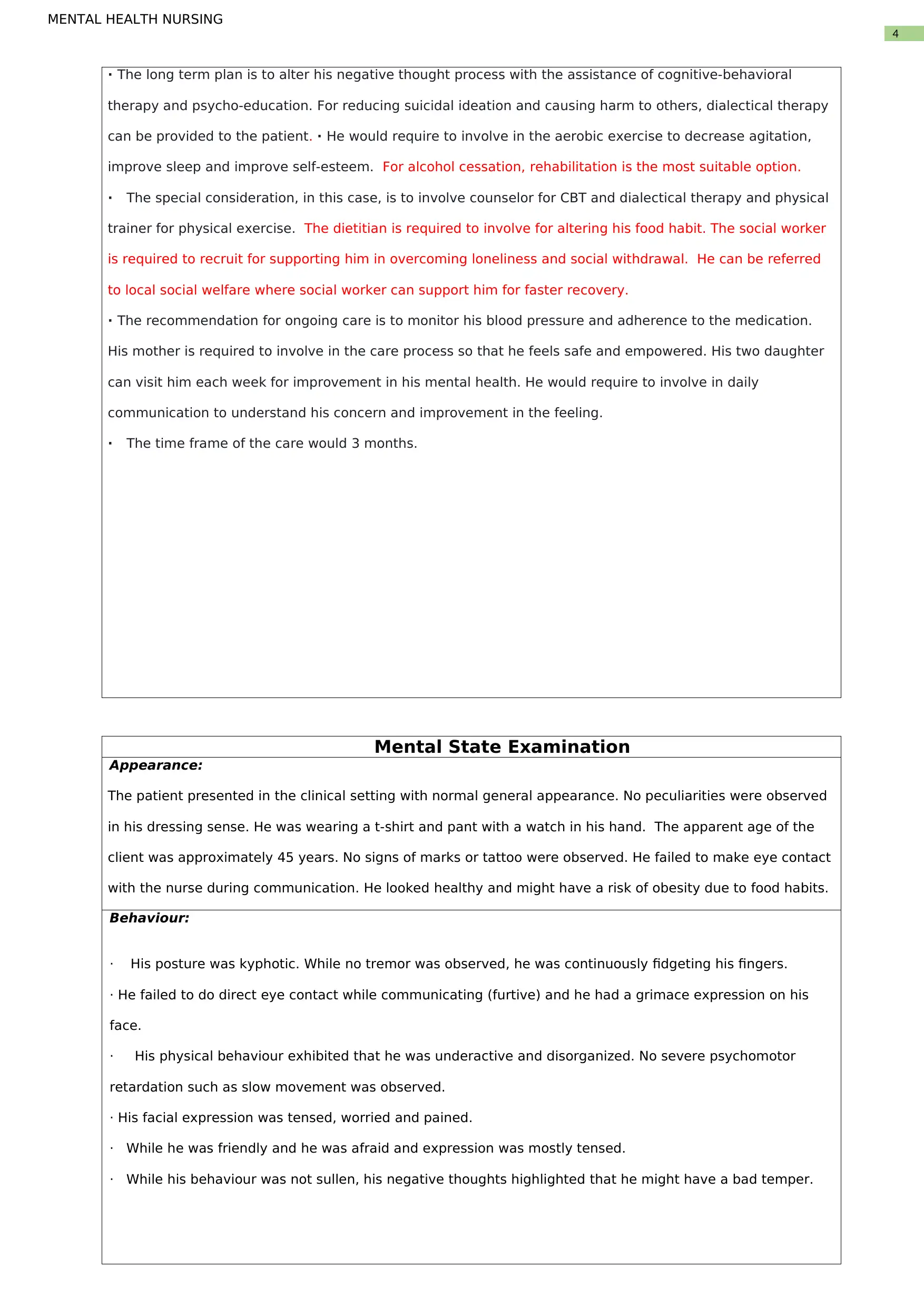
4
MENTAL HEALTH NURSING
· The long term plan is to alter his negative thought process with the assistance of cognitive-behavioral
therapy and psycho-education. For reducing suicidal ideation and causing harm to others, dialectical therapy
can be provided to the patient. · He would require to involve in the aerobic exercise to decrease agitation,
improve sleep and improve self-esteem. For alcohol cessation, rehabilitation is the most suitable option.
· The special consideration, in this case, is to involve counselor for CBT and dialectical therapy and physical
trainer for physical exercise. The dietitian is required to involve for altering his food habit. The social worker
is required to recruit for supporting him in overcoming loneliness and social withdrawal. He can be referred
to local social welfare where social worker can support him for faster recovery.
· The recommendation for ongoing care is to monitor his blood pressure and adherence to the medication.
His mother is required to involve in the care process so that he feels safe and empowered. His two daughter
can visit him each week for improvement in his mental health. He would require to involve in daily
communication to understand his concern and improvement in the feeling.
· The time frame of the care would 3 months.
Mental State Examination
Appearance:
The patient presented in the clinical setting with normal general appearance. No peculiarities were observed
in his dressing sense. He was wearing a t-shirt and pant with a watch in his hand. The apparent age of the
client was approximately 45 years. No signs of marks or tattoo were observed. He failed to make eye contact
with the nurse during communication. He looked healthy and might have a risk of obesity due to food habits.
Behaviour:
· His posture was kyphotic. While no tremor was observed, he was continuously fidgeting his fingers.
· He failed to do direct eye contact while communicating (furtive) and he had a grimace expression on his
face.
· His physical behaviour exhibited that he was underactive and disorganized. No severe psychomotor
retardation such as slow movement was observed.
· His facial expression was tensed, worried and pained.
· While he was friendly and he was afraid and expression was mostly tensed.
· While his behaviour was not sullen, his negative thoughts highlighted that he might have a bad temper.
MENTAL HEALTH NURSING
· The long term plan is to alter his negative thought process with the assistance of cognitive-behavioral
therapy and psycho-education. For reducing suicidal ideation and causing harm to others, dialectical therapy
can be provided to the patient. · He would require to involve in the aerobic exercise to decrease agitation,
improve sleep and improve self-esteem. For alcohol cessation, rehabilitation is the most suitable option.
· The special consideration, in this case, is to involve counselor for CBT and dialectical therapy and physical
trainer for physical exercise. The dietitian is required to involve for altering his food habit. The social worker
is required to recruit for supporting him in overcoming loneliness and social withdrawal. He can be referred
to local social welfare where social worker can support him for faster recovery.
· The recommendation for ongoing care is to monitor his blood pressure and adherence to the medication.
His mother is required to involve in the care process so that he feels safe and empowered. His two daughter
can visit him each week for improvement in his mental health. He would require to involve in daily
communication to understand his concern and improvement in the feeling.
· The time frame of the care would 3 months.
Mental State Examination
Appearance:
The patient presented in the clinical setting with normal general appearance. No peculiarities were observed
in his dressing sense. He was wearing a t-shirt and pant with a watch in his hand. The apparent age of the
client was approximately 45 years. No signs of marks or tattoo were observed. He failed to make eye contact
with the nurse during communication. He looked healthy and might have a risk of obesity due to food habits.
Behaviour:
· His posture was kyphotic. While no tremor was observed, he was continuously fidgeting his fingers.
· He failed to do direct eye contact while communicating (furtive) and he had a grimace expression on his
face.
· His physical behaviour exhibited that he was underactive and disorganized. No severe psychomotor
retardation such as slow movement was observed.
· His facial expression was tensed, worried and pained.
· While he was friendly and he was afraid and expression was mostly tensed.
· While his behaviour was not sullen, his negative thoughts highlighted that he might have a bad temper.
Paraphrase This Document
Need a fresh take? Get an instant paraphrase of this document with our AI Paraphraser
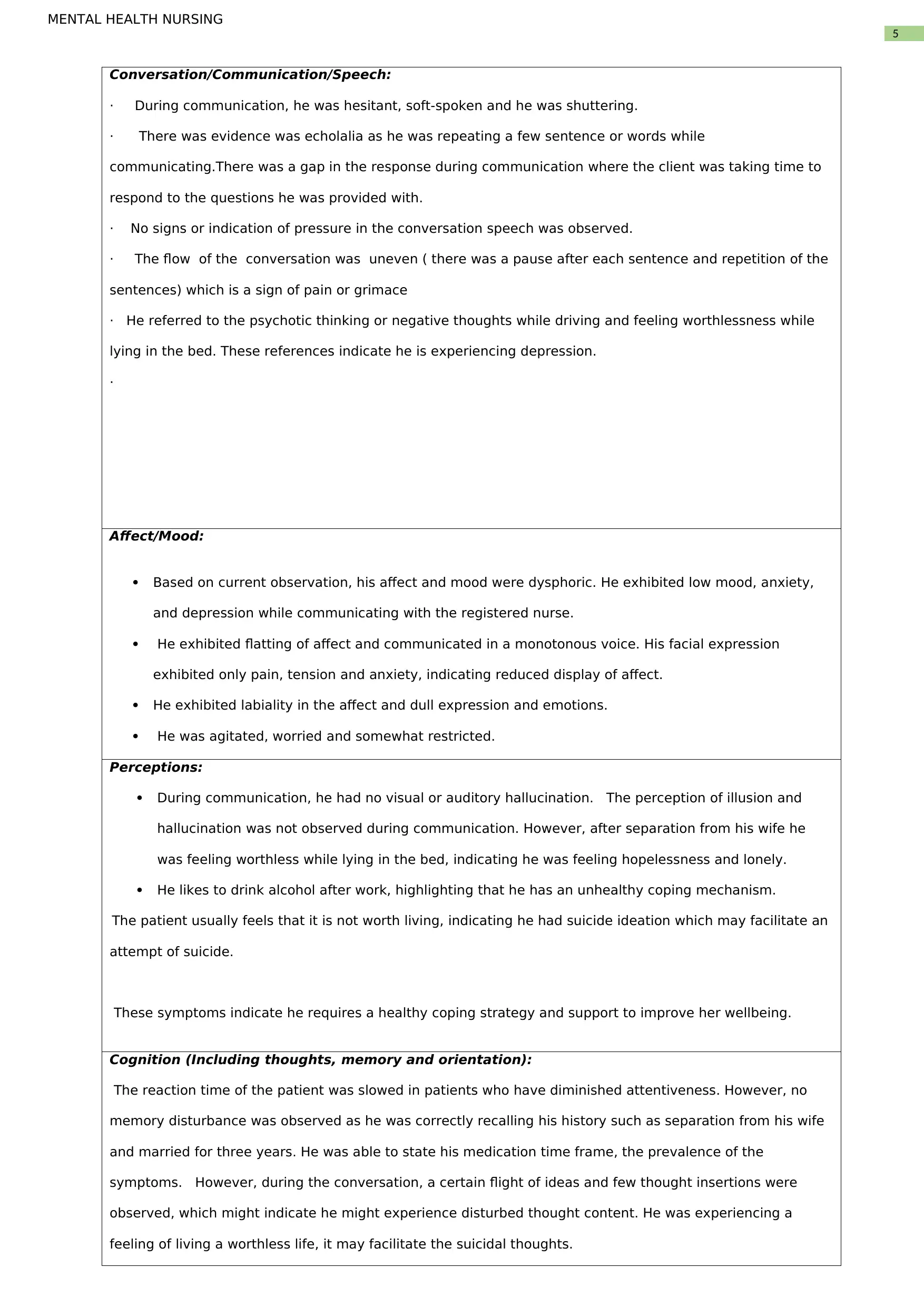
5
MENTAL HEALTH NURSING
Conversation/Communication/Speech:
· During communication, he was hesitant, soft-spoken and he was shuttering.
· There was evidence was echolalia as he was repeating a few sentence or words while
communicating.There was a gap in the response during communication where the client was taking time to
respond to the questions he was provided with.
· No signs or indication of pressure in the conversation speech was observed.
· The flow of the conversation was uneven ( there was a pause after each sentence and repetition of the
sentences) which is a sign of pain or grimace
· He referred to the psychotic thinking or negative thoughts while driving and feeling worthlessness while
lying in the bed. These references indicate he is experiencing depression.
·
Affect/Mood:
Based on current observation, his affect and mood were dysphoric. He exhibited low mood, anxiety,
and depression while communicating with the registered nurse.
He exhibited flatting of affect and communicated in a monotonous voice. His facial expression
exhibited only pain, tension and anxiety, indicating reduced display of affect.
He exhibited labiality in the affect and dull expression and emotions.
He was agitated, worried and somewhat restricted.
Perceptions:
During communication, he had no visual or auditory hallucination. The perception of illusion and
hallucination was not observed during communication. However, after separation from his wife he
was feeling worthless while lying in the bed, indicating he was feeling hopelessness and lonely.
He likes to drink alcohol after work, highlighting that he has an unhealthy coping mechanism.
The patient usually feels that it is not worth living, indicating he had suicide ideation which may facilitate an
attempt of suicide.
These symptoms indicate he requires a healthy coping strategy and support to improve her wellbeing.
Cognition (Including thoughts, memory and orientation):
The reaction time of the patient was slowed in patients who have diminished attentiveness. However, no
memory disturbance was observed as he was correctly recalling his history such as separation from his wife
and married for three years. He was able to state his medication time frame, the prevalence of the
symptoms. However, during the conversation, a certain flight of ideas and few thought insertions were
observed, which might indicate he might experience disturbed thought content. He was experiencing a
feeling of living a worthless life, it may facilitate the suicidal thoughts.
MENTAL HEALTH NURSING
Conversation/Communication/Speech:
· During communication, he was hesitant, soft-spoken and he was shuttering.
· There was evidence was echolalia as he was repeating a few sentence or words while
communicating.There was a gap in the response during communication where the client was taking time to
respond to the questions he was provided with.
· No signs or indication of pressure in the conversation speech was observed.
· The flow of the conversation was uneven ( there was a pause after each sentence and repetition of the
sentences) which is a sign of pain or grimace
· He referred to the psychotic thinking or negative thoughts while driving and feeling worthlessness while
lying in the bed. These references indicate he is experiencing depression.
·
Affect/Mood:
Based on current observation, his affect and mood were dysphoric. He exhibited low mood, anxiety,
and depression while communicating with the registered nurse.
He exhibited flatting of affect and communicated in a monotonous voice. His facial expression
exhibited only pain, tension and anxiety, indicating reduced display of affect.
He exhibited labiality in the affect and dull expression and emotions.
He was agitated, worried and somewhat restricted.
Perceptions:
During communication, he had no visual or auditory hallucination. The perception of illusion and
hallucination was not observed during communication. However, after separation from his wife he
was feeling worthless while lying in the bed, indicating he was feeling hopelessness and lonely.
He likes to drink alcohol after work, highlighting that he has an unhealthy coping mechanism.
The patient usually feels that it is not worth living, indicating he had suicide ideation which may facilitate an
attempt of suicide.
These symptoms indicate he requires a healthy coping strategy and support to improve her wellbeing.
Cognition (Including thoughts, memory and orientation):
The reaction time of the patient was slowed in patients who have diminished attentiveness. However, no
memory disturbance was observed as he was correctly recalling his history such as separation from his wife
and married for three years. He was able to state his medication time frame, the prevalence of the
symptoms. However, during the conversation, a certain flight of ideas and few thought insertions were
observed, which might indicate he might experience disturbed thought content. He was experiencing a
feeling of living a worthless life, it may facilitate the suicidal thoughts.
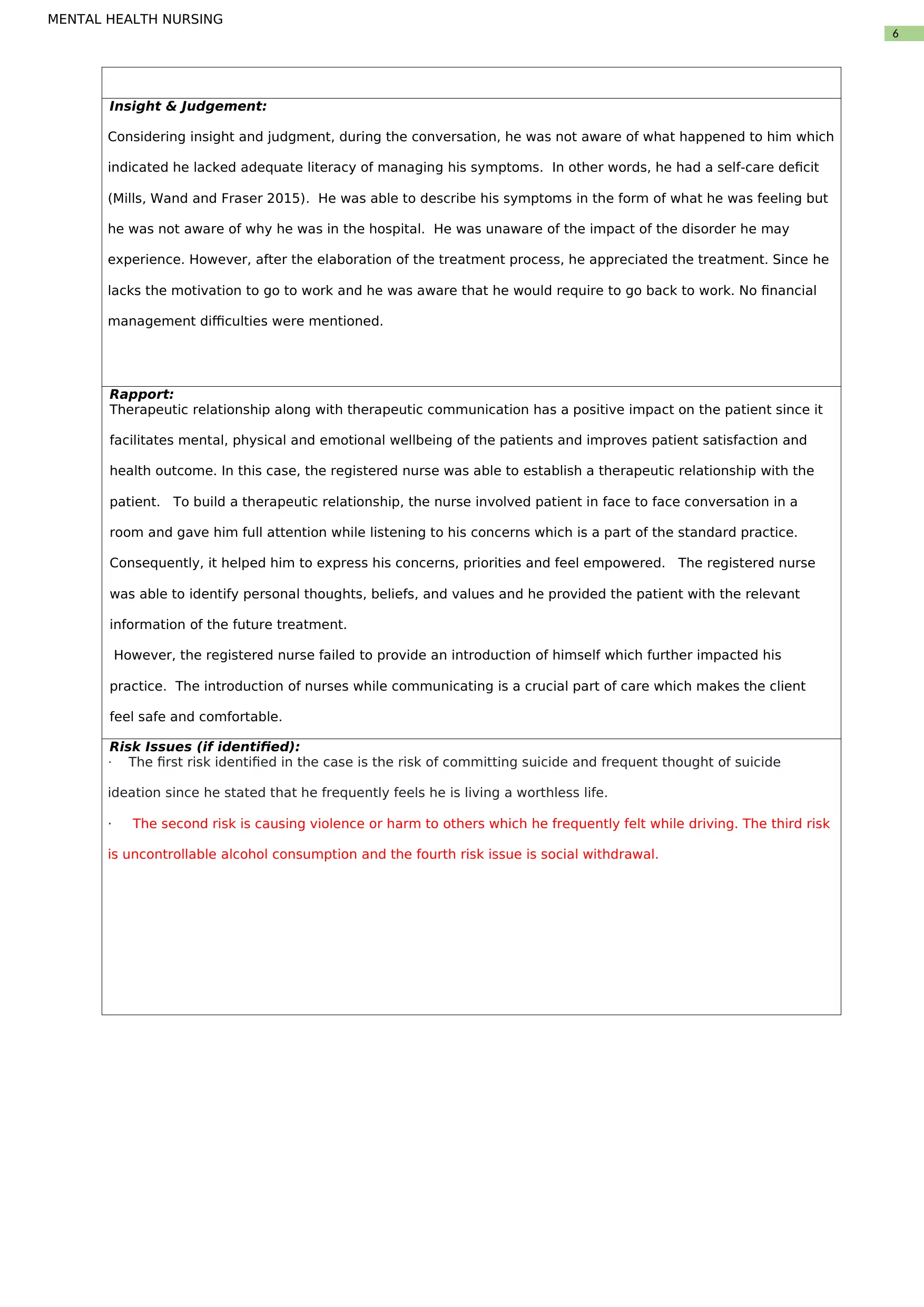
6
MENTAL HEALTH NURSING
Insight & Judgement:
Considering insight and judgment, during the conversation, he was not aware of what happened to him which
indicated he lacked adequate literacy of managing his symptoms. In other words, he had a self-care deficit
(Mills, Wand and Fraser 2015). He was able to describe his symptoms in the form of what he was feeling but
he was not aware of why he was in the hospital. He was unaware of the impact of the disorder he may
experience. However, after the elaboration of the treatment process, he appreciated the treatment. Since he
lacks the motivation to go to work and he was aware that he would require to go back to work. No financial
management difficulties were mentioned.
Rapport:
Therapeutic relationship along with therapeutic communication has a positive impact on the patient since it
facilitates mental, physical and emotional wellbeing of the patients and improves patient satisfaction and
health outcome. In this case, the registered nurse was able to establish a therapeutic relationship with the
patient. To build a therapeutic relationship, the nurse involved patient in face to face conversation in a
room and gave him full attention while listening to his concerns which is a part of the standard practice.
Consequently, it helped him to express his concerns, priorities and feel empowered. The registered nurse
was able to identify personal thoughts, beliefs, and values and he provided the patient with the relevant
information of the future treatment.
However, the registered nurse failed to provide an introduction of himself which further impacted his
practice. The introduction of nurses while communicating is a crucial part of care which makes the client
feel safe and comfortable.
Risk Issues (if identified):
· The first risk identified in the case is the risk of committing suicide and frequent thought of suicide
ideation since he stated that he frequently feels he is living a worthless life.
· The second risk is causing violence or harm to others which he frequently felt while driving. The third risk
is uncontrollable alcohol consumption and the fourth risk issue is social withdrawal.
MENTAL HEALTH NURSING
Insight & Judgement:
Considering insight and judgment, during the conversation, he was not aware of what happened to him which
indicated he lacked adequate literacy of managing his symptoms. In other words, he had a self-care deficit
(Mills, Wand and Fraser 2015). He was able to describe his symptoms in the form of what he was feeling but
he was not aware of why he was in the hospital. He was unaware of the impact of the disorder he may
experience. However, after the elaboration of the treatment process, he appreciated the treatment. Since he
lacks the motivation to go to work and he was aware that he would require to go back to work. No financial
management difficulties were mentioned.
Rapport:
Therapeutic relationship along with therapeutic communication has a positive impact on the patient since it
facilitates mental, physical and emotional wellbeing of the patients and improves patient satisfaction and
health outcome. In this case, the registered nurse was able to establish a therapeutic relationship with the
patient. To build a therapeutic relationship, the nurse involved patient in face to face conversation in a
room and gave him full attention while listening to his concerns which is a part of the standard practice.
Consequently, it helped him to express his concerns, priorities and feel empowered. The registered nurse
was able to identify personal thoughts, beliefs, and values and he provided the patient with the relevant
information of the future treatment.
However, the registered nurse failed to provide an introduction of himself which further impacted his
practice. The introduction of nurses while communicating is a crucial part of care which makes the client
feel safe and comfortable.
Risk Issues (if identified):
· The first risk identified in the case is the risk of committing suicide and frequent thought of suicide
ideation since he stated that he frequently feels he is living a worthless life.
· The second risk is causing violence or harm to others which he frequently felt while driving. The third risk
is uncontrollable alcohol consumption and the fourth risk issue is social withdrawal.
⊘ This is a preview!⊘
Do you want full access?
Subscribe today to unlock all pages.

Trusted by 1+ million students worldwide

7
MENTAL HEALTH NURSING
MENTAL HEALTH NURSING
1 out of 7
Related Documents
Your All-in-One AI-Powered Toolkit for Academic Success.
+13062052269
info@desklib.com
Available 24*7 on WhatsApp / Email
![[object Object]](/_next/static/media/star-bottom.7253800d.svg)
Unlock your academic potential
Copyright © 2020–2026 A2Z Services. All Rights Reserved. Developed and managed by ZUCOL.





